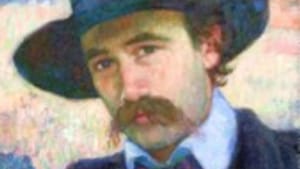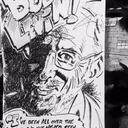Stay in the Loop
BSR publishes on a weekly schedule, with an email newsletter every Wednesday and Thursday morning. There’s no paywall, and subscribing is always free.
Becoming a writer, c. 1961: Timid first steps at Brandeis
How I became a writer, c. 1961 (Part 2)

Part 2 of a memoir.
Sophomore year at Brandeis, I took Humanities II with Miss Steinberg. She had a moon face, tortoise shell glasses and brown hair braided into a bun, and she sat one George Eliot thesis short of a Harvard Ph.D. (If we were alone and I was Humphrey Bogart, I thought, the glasses would come off and the hair would shake free.) She liked me, but I tried her patience.
The biggest trial was my explication of Nat Hiken's superiority to Molière. My thesis was simple. Comedies were supposed to be funny; Sergeant Bilko made me laugh; Tartuffe did not. (The term sophomoric may have been invented for me.) Then I compared the unpremeditated murder in L'Etranger, which I dug, to that in Gide's Lafcadio's Adventures, which I really dug.
"You should consider a creative writing course," Miss Steinberg said.
An unlikely family
Miss Steinberg (a pseudonym, like the other names in this memoir) would have startled me less by announcing that Andre Gide thought he could take me off the dribble. My West Philadelphia family didn't seem a fertile breeding ground for writers. It contained no alcoholics or drug addicts or sexual or physical abusers. No one at our seder had even committed infidelities or contemplated divorce. (Or if they had, word of it hadn't reached me.) No one in my extended family wrote or painted, sculpted or composed. My relatives were doctors or lawyers or schoolteachers. If my cousins and I did not become (or marry) doctors or lawyers or teachers, it was presumed we would starve. The closest we came to on-the-job creativity was my mother's half-brother Abe, who mixed paints at Glidden's.
Then there was the Brandeis perspective. Writers wore black turtlenecks and jeans. They played guitars at Chomondeley's, the campus coffee house. They went to Cambridge for New Wave film festivals at the Brattle. They carried, for God's sake, green book bags.
I wore crew necks and khakis. I played three-on-three in the gym. If I went to Cambridge, it was for roast beef specials at Elsie's, not for Truffaut. (I knew someone who saw The Four-Hundred Blows. "Not even one," he reported back afterward.) The only student of my acquaintance with a green book bag, Mike Gaunt, had lifted it from a shelf in the bookstore to fill with texts he wanted to swipe.
The dreaded suburban sell-out
But I had the judgments of Mrs. Medvedev and Miss Steinberg in my head. Plus, something Brandeisian was working on me. A rebel stream had run through the 1950s sea of repression and conformity in which I'd grown. It had flowed through the books and movies in which the protagonist woke up, at age 40, with a wife and 2.4 kids, a house in the suburbs and a station wagon in the garage, and realized he had lost his soul. Anyone who had applied to fraternity-free Brandeis"“ yes, we had a coffee house but no fraternities"“ had already been carried some distance by that current and, having arrived there, no matter how uncomfortably, accelerated its rush.
I still planned to go to law school. But law school was for sell-outs, and writing... writing was cool.
The great professor
Brandeis offered two one-semester writing courses. The most highly regarded was taught by David Leviathan, a gaunt, chain-smoking Brit who was given to brilliant pronouncements that came out sounding like, "Kafkamumblemumbledespair mumblegrumble-futilityofexistencemumblerumblemumble: OBLIVION!"
His one published novel"“ New Directions"“ about a patricide, exceeded the fiction output of the rest of the faculty within the prior two decades. All the striving would-be writers on campus fought for room at his sandaled feet.
I made an appointment with Dr. Leviathan. He wore a black suit, white shirt, bolo tie. He looked up from Journey to the End of Night and regarded me the way a botanist would a new species of lichen. I explained that my Hum II instructor had suggested I take his course. My English Comp teacher, I said, buttressing my presentation, liked me too.
These straws hovered in a draft from the void. "But I haven't actually written a story since 11th grade," I added. "Do you think that would present a problem?"
"Bloodymumblefumblemumbleinsurmountable, I should imagine." He blew me away like ash from his Gauloise.â—†
To be continued.
To read the first installment, click here.
To read the next installment, click here.
Sophomore year at Brandeis, I took Humanities II with Miss Steinberg. She had a moon face, tortoise shell glasses and brown hair braided into a bun, and she sat one George Eliot thesis short of a Harvard Ph.D. (If we were alone and I was Humphrey Bogart, I thought, the glasses would come off and the hair would shake free.) She liked me, but I tried her patience.
The biggest trial was my explication of Nat Hiken's superiority to Molière. My thesis was simple. Comedies were supposed to be funny; Sergeant Bilko made me laugh; Tartuffe did not. (The term sophomoric may have been invented for me.) Then I compared the unpremeditated murder in L'Etranger, which I dug, to that in Gide's Lafcadio's Adventures, which I really dug.
"You should consider a creative writing course," Miss Steinberg said.
An unlikely family
Miss Steinberg (a pseudonym, like the other names in this memoir) would have startled me less by announcing that Andre Gide thought he could take me off the dribble. My West Philadelphia family didn't seem a fertile breeding ground for writers. It contained no alcoholics or drug addicts or sexual or physical abusers. No one at our seder had even committed infidelities or contemplated divorce. (Or if they had, word of it hadn't reached me.) No one in my extended family wrote or painted, sculpted or composed. My relatives were doctors or lawyers or schoolteachers. If my cousins and I did not become (or marry) doctors or lawyers or teachers, it was presumed we would starve. The closest we came to on-the-job creativity was my mother's half-brother Abe, who mixed paints at Glidden's.
Then there was the Brandeis perspective. Writers wore black turtlenecks and jeans. They played guitars at Chomondeley's, the campus coffee house. They went to Cambridge for New Wave film festivals at the Brattle. They carried, for God's sake, green book bags.
I wore crew necks and khakis. I played three-on-three in the gym. If I went to Cambridge, it was for roast beef specials at Elsie's, not for Truffaut. (I knew someone who saw The Four-Hundred Blows. "Not even one," he reported back afterward.) The only student of my acquaintance with a green book bag, Mike Gaunt, had lifted it from a shelf in the bookstore to fill with texts he wanted to swipe.
The dreaded suburban sell-out
But I had the judgments of Mrs. Medvedev and Miss Steinberg in my head. Plus, something Brandeisian was working on me. A rebel stream had run through the 1950s sea of repression and conformity in which I'd grown. It had flowed through the books and movies in which the protagonist woke up, at age 40, with a wife and 2.4 kids, a house in the suburbs and a station wagon in the garage, and realized he had lost his soul. Anyone who had applied to fraternity-free Brandeis"“ yes, we had a coffee house but no fraternities"“ had already been carried some distance by that current and, having arrived there, no matter how uncomfortably, accelerated its rush.
I still planned to go to law school. But law school was for sell-outs, and writing... writing was cool.
The great professor
Brandeis offered two one-semester writing courses. The most highly regarded was taught by David Leviathan, a gaunt, chain-smoking Brit who was given to brilliant pronouncements that came out sounding like, "Kafkamumblemumbledespair mumblegrumble-futilityofexistencemumblerumblemumble: OBLIVION!"
His one published novel"“ New Directions"“ about a patricide, exceeded the fiction output of the rest of the faculty within the prior two decades. All the striving would-be writers on campus fought for room at his sandaled feet.
I made an appointment with Dr. Leviathan. He wore a black suit, white shirt, bolo tie. He looked up from Journey to the End of Night and regarded me the way a botanist would a new species of lichen. I explained that my Hum II instructor had suggested I take his course. My English Comp teacher, I said, buttressing my presentation, liked me too.
These straws hovered in a draft from the void. "But I haven't actually written a story since 11th grade," I added. "Do you think that would present a problem?"
"Bloodymumblefumblemumbleinsurmountable, I should imagine." He blew me away like ash from his Gauloise.â—†
To be continued.
To read the first installment, click here.
To read the next installment, click here.
Sign up for our newsletter
All of the week's new articles, all in one place. Sign up for the free weekly BSR newsletters, and don't miss a conversation.

 Bob Levin
Bob Levin